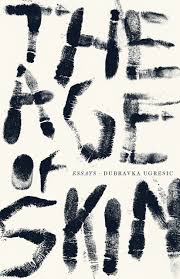In her new essay collection, The Age of Skin, the Croatian-born novelist and critic Dubravka Ugresic tells the story of an exchange between a little girl and a group of psych-ward doctors during the shelling of Sarajevo. The doctors asked the girl what she was most afraid of in the midst of the former Yugoslavia’s civil war. “People,” she replied. If you know Ugresic’s writing, it’s easy to see why she finds the anecdote so appealing. It has the shape of a joke — the doctor-patient set-up, the unexpected response that catches you short. But it’s not so much a joke as a more efficient way to get to a truth we’d prefer to avoid.
 The Age of Skin, her seventh essay collection, was written between 2014 and 2018, a time that marked the rise of Trumpism in the United States and analogous far-right populist movements overseas. Those movements are old news for Ugresic, and the book’s pages betray both an eagerness to call out the contemporary crisis and an exhaustion with all the crises that have piled up before now. Her antiwar writings got her bullied out of Croatia in the mid-90s — she was called a “feminist raping Croatia” and now lives in Amsterdam — but she’s persistently critiqued how ignorance slithers around politics in the United States and Europe, especially her birthplace. You might call it patriotism if she were not so alert to the way patriotism tends to signal misogynistic and warmongering tendencies. “Stupidity struts its patriotism and thinks that for its volunteer effort of loving its homeland it should receive full financial compensation,” she writes.
The Age of Skin, her seventh essay collection, was written between 2014 and 2018, a time that marked the rise of Trumpism in the United States and analogous far-right populist movements overseas. Those movements are old news for Ugresic, and the book’s pages betray both an eagerness to call out the contemporary crisis and an exhaustion with all the crises that have piled up before now. Her antiwar writings got her bullied out of Croatia in the mid-90s — she was called a “feminist raping Croatia” and now lives in Amsterdam — but she’s persistently critiqued how ignorance slithers around politics in the United States and Europe, especially her birthplace. You might call it patriotism if she were not so alert to the way patriotism tends to signal misogynistic and warmongering tendencies. “Stupidity struts its patriotism and thinks that for its volunteer effort of loving its homeland it should receive full financial compensation,” she writes.
So the least surprising line in The Age of Skin may be this: “The word happiness is not part of my vocabulary, and the question of whether or not I’m happy is one I haven’t asked myself for some thirty years.” But the collection is also witty, funny, and furious — happiness, however much it might be wished for, would only cloud her observations. In “The Scold’s Bridle,” she explores how misogyny has intensified in post-Communist Europe. “Don’t Take It Personally” uses a Slovenian pop song to riff on a growing and baffling nostalgia for the old authoritarianism. “La La People” laments rising cultural groupthink. And the title essay uses Lenin’s embalming and tattoos as symbols for a persistent zombification of society and culture, leading to “avaricious publishers, laggardly editors, wishy-washy critics, unambitious readers, and authors lacking in talent but greedy for fame.” She puts that essay up first.
Two things (aside from Ellen Elias-Bursać’s crisp translation) keep these pieces from lapsing into scolding, and those two things are somewhat in contradiction with each other. First is the clear sense that none of Ugresic’s fury is abstracted, that her despair is nearly as intimate as that of the little girl in Sarajevo. Writing on Norway’s brief obsession with a TV show depicting nothing but an hours-long train ride, she can’t share the charmed feeling many have toward the program’s deliberate (and monetizable) slowness; she sees only echoes of dreary Soviet TV weather reports, and a soporistic culture that leaves people exploitable. We are a society that is rapidly losing its cultural memory and moral rudder, gaining ignorance in its stead: When a 2015 survey of young Croatians revealed a society that substantially embraced homophobia and fascism, she notes that nobody batted an eye.
 But the second thing Ugresic can do with this material is abstract it, take the raw materials of neo-fascism and creeping know-nothingism and find new metaphors for them to work in. In “There’s Nothing Here!,” the strongest essay in this collection, she uses the erasure of Croatia’s past architecture to illuminate how its current populism tries to deliberately push away outsiders and refugees — by claiming there’s nothing there and making others move along, it hastens the death of national history and conscience. Milquetoast progressives, to her mind, only help the process. “While tasteful left-leaning politicians weigh and gauge their new political, social, and cultural constellations,” she writes, “the local neo-fascists and neo-Nazis are having loads of fun and are showing their frank intention to have loads more fun in the near future.”
But the second thing Ugresic can do with this material is abstract it, take the raw materials of neo-fascism and creeping know-nothingism and find new metaphors for them to work in. In “There’s Nothing Here!,” the strongest essay in this collection, she uses the erasure of Croatia’s past architecture to illuminate how its current populism tries to deliberately push away outsiders and refugees — by claiming there’s nothing there and making others move along, it hastens the death of national history and conscience. Milquetoast progressives, to her mind, only help the process. “While tasteful left-leaning politicians weigh and gauge their new political, social, and cultural constellations,” she writes, “the local neo-fascists and neo-Nazis are having loads of fun and are showing their frank intention to have loads more fun in the near future.”
Ugresic’s tone is generally controlled throughout The Age of Skin, but righteous indignation has a way of lapsing into overstatement. No, a photo of Kim Kardashian’s bare ass isn’t “the final greeting from a civilization breathing its last”; to call Fifty Shades of Grey an exemplar of global exploitative tendencies gives E.L. James way too much credit, even if you’re half-joking. She includes too many apt metaphors for the moment — walls, collapsing structures, flags — to bother with the frivolous ones. I read The Age of Skin during a tense week of awaiting word of Joe Biden’s election, and I’m writing this as Donald Trump labors to magic his loss into a victory. The book echoes the mood: the way populism “can be translated as the rule of the illiterate,” her awareness that “an army of unqualified historians is toiling today, erasing antifascist history and legalizing revisionist historical versions.”
Among authoritarianism’s horrors, for Ugresic, is its relentless sameness — the repeated doleful weather reports, the same glib oligarchs, the same contempt for culture wherever you go, a social flatness that narcotizes people in the face of violent hatreds. “The true terror begins when we begin to feel there is nowhere left to emigrate to, that all destinations are equally bad,” she writes. “The only hope left for us is that we haven’t been faced with the last wall. We haven’t, have we?” Good question.
[Published November 17, 2020 by Open Letter, 240 pages, $16.95 paperback]